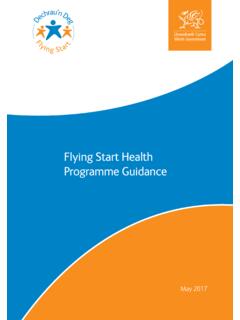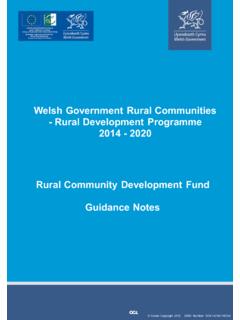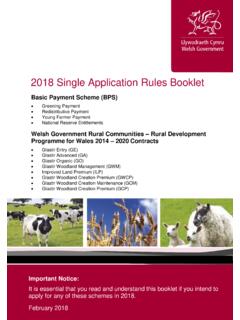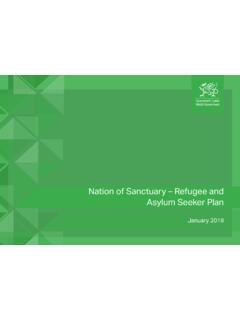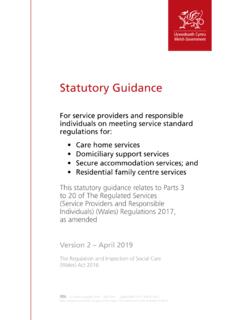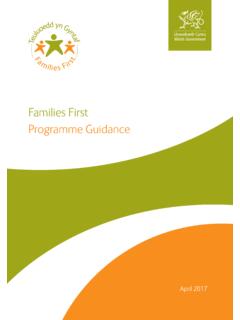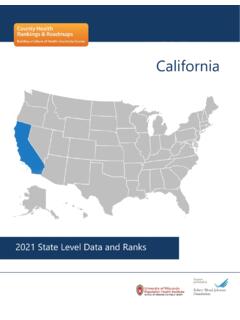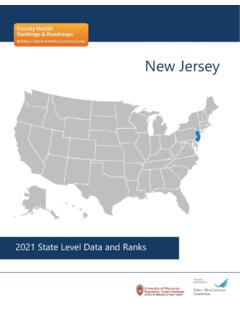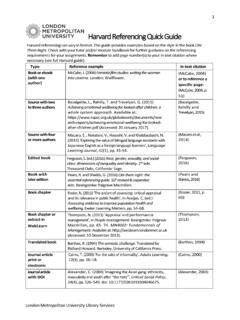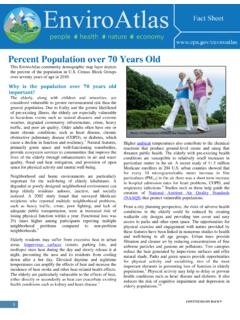Transcription of Palliative and End of Life Care Delivery Plan
1 Palliative and End of life care Delivery Plan March 2017. Crown copyright 2016 WG31377 Digital ISBN: 978-1-4743-9321-6. Mae'r ddogfen yma hefyd ar gael yn Gymraeg / This document is also available in Welsh. CONTENTS. Foreword Page 01. Introduction and Context Page 03. End of life care Implementation Board Page 04. Patient Voice/Experience Page 04. Primary care and Acute care Page 05. Children and Young People Page 06. Measuring Success Page 08. Research Page 09. Implementing the Delivery Plan Page 10. Delivery Theme 1: - Supporting Living and Dying Well Page 11. Delivery Theme 2: - Detecting and Identifying Patients Early Page 12. Delivery Theme 3: - Delivering Fast Effective care Page 13.
2 Delivery Theme 4: - Reducing the Distress of Terminal Illness Page 14. for Patients and their Families Delivery Theme 5: - Improving Information Page 15. Delivery Theme 6: - Targeting Research Page 16. Delivery Theme 7: - Education Page 17. Annex 1: Strategic and Legislative Changes Page 18. Annex 2: Website Links Page 21. Foreword As chair of the End of life care Board and National Clinical Lead for End of life care , we would like to acknowledge the work undertaken to improve end of life care which began with the Sugar Report in 2009. The progress to date has relied on strong clinical leadership and effective co-productive working between NHS Wales and our third sector partners.
3 As a Board, we are resolved to ensure that this updated Delivery plan capitalises on the success achieved to date and maintains a collegiate approach to improving end of life care in Wales. Our End of life care Board is supported by a well-established Adult Palliative care Clinical Implementation Group, chaired by Dr Mel Jefferson, and an all-Wales Paediatric Palliative care Network and Implementation Group, chaired by Dr Richard Hain, which enables a one Wales approach, providing peer support and acting as an effective information sharing platform. Our aim is for People in Wales to have a healthy, realistic approach to dying, and to be able to plan appropriately for the event.
4 We want them to be able to end their days in the location of their choice be that home, hospital or hospice and we want them to have access to high quality care wherever they live and die, whatever their underlying disease or disability. The role of the End of life care Board is to drive forward the national plan and support health boards to deliver their local plans. This will be delivered by building on the relationships, systems and procedures already in place to make the most of their potential. Our collaborative approach will use the Palliative care Clinical Implementation Group and other relevant Implementation Groups to work with the NHS and third sector partners to effect change.
5 The all-Wales Paediatric Palliative care Network and Implementation Group was developed to ensure improvements in care for those with life limiting conditions from birth, through childhood and into teenage years. This is delivered by working with the children's hospices, T Hafan and T Gobaith/Hope House, to find service solutions to meet paediatric Palliative care needs in each health board area. Providing good care for patients at the end of life is of primary importance. We also know that good care facilitates a healthy grieving process for the bereaved. Appropriate bereavement care is important and we will continue to work to promote services for those who need ongoing support after a death.
6 We will consider how we can better engage with patients and gain an insight into their experience, both nationally and locally, to ensure services are genuinely co- produced with structured and broad input. We will develop outcome measures that more accurately reflect the experience of the patient and those close to them. Given the intense pressure on acute hospital beds, there is a need for a wider range of care interventions to be delivered directly to patients in their own homes. There is also a need for greater teaching of relatives/proxy on aspects of care , including basic moving and handling, tailored to the individual's needs. It is 1.
7 Unsustainable in the long term to continue to move patients reaching the end of their lives to hospital for interventions and serious consideration must be given to ways of delivering more interventions in the community for patients of all ages. We have also committed to supporting a programme of education which includes our Workforce Leadership Programme which is helping to develop future leaders into 2020 and beyond. Through Advance care Planning we are working to understand the legal framework around decision-making on behalf of those who lack mental capacity for that decision at that time, and exploring ways to communicate such decisions across all sectors.
8 In addition we are improving communication with patients through the continued roll out of our Facilitating Serious Illness' conversations training programme which is equipping staff with ways to open, pursue and close such difficult conversations. Increasingly digital technology is also being used to support patients and enable them to play a part in their own care . We will make appropriate use of digital, telehealth and telemedicine wherever possible to help patients deliver self care . We all have a part to play in achieving the ambitions of this plan, including local communities and individuals. People do not choose to develop or indeed to be born with an incurable condition.
9 Through the gradual ageing process, we will all reach a point where life expectancy is limited. People can however choose to minimise risk through lifestyle choices and such measures can significantly impact on people's health . A healthy approach to dying, planning ahead and informing family and friends of their wishes can result in improved person centred, tailored care at the end of life . This is judicious, prudent health and social care at its best. There are still many challenges that remain and stakeholders must continue to work together to build on the significant progress that has been achieved to date. health Boards must continue to work closely with their third sector partners to deliver the best possible end of life care throughout Wales.
10 Steve Ham Chair End of life care Implementation Board Prof Ilora Baroness Finlay CEO Velindre NHS Trust National Clinical Lead End of life care 2. Introduction and Context It is estimated that (23,000) of the overall population in Wales have Palliative care needs at any one time1 and the number of people dying each year continues to increase. This means that we will see more people living with multi-morbidity and frailty, not necessarily following a typical or predictable trajectory towards death. A recent Marie Curie Report: Palliative care and the UK nations - an updated assessment on need, policy and strategy' (2015) 2 reported that the work to implement the recommendations of the Sugar Report has put Wales as a nation ahead of the game'.

